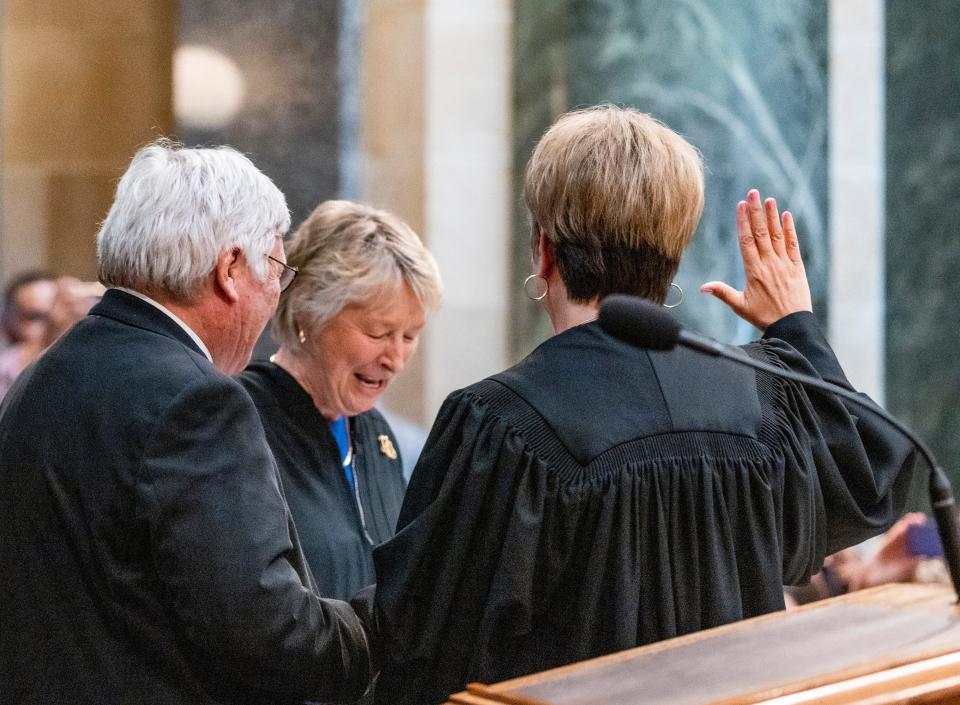Ann Walsh Bradley's retirement sets the stage for another high stakes Wisconsin Supreme Court race
MADISON – The retirement of the state Supreme Court's longest-serving justice sets up another battle for control of the state's highest court just two years after more than $50 million was poured into a race that created a liberal majority for the first time in more than a decade.
Justice Ann Walsh Bradley, 73, will leave the court next year after serving 30 years. When Justice Janet Protasiewicz was elected in 2023, Walsh Bradley said it was the first time she would serve with a true liberal majority. Now, as she departs, the same partisan interests are expected to create another expensive battle for control of the court.
Already, political heavyweights are adding their names to the potential roster of candidates.
Former Republican Attorney General Brad Schimel, who is now a Waukesha County Circuit judge, launched a campaign for Supreme Court in December. State Court of Appeals Judge Chris Taylor, who is a former Democratic state lawmaker and policy director of Planned Parenthood of Wisconsin, told the Milwaukee Journal Sentinel on Thursday she is considering a run. Dane County Circuit Judge Susan Crawford, a former partner with the Pines Bach law firm, also confirmed she is considering a bid.
The race will come after the new liberal majority upended Wisconsin Republicans' control of the state Legislature by ordering new electoral maps that give Democrats a chance at taking control of the chambers for the first time in more than a decade. The court also will soon determine whether abortion remains available to women in Wisconsin.
To former Supreme Court Justice Janine Geske, who served on the court with her in the 1990s, Walsh Bradley represents “an ideal justice."

“She is somebody who's absolutely committed to the independence of the judiciary and really feels strongly that it should not be politicized, even though it certainly has become that in elections,” Geske said.
Walsh Bradley’s departure will mean a loss of significant institutional knowledge for the court, Geske said, noting that that applies not just to previous rulings but to the court’s inner workings and administrative decisions.
How the court’s dynamic will change in Bradley’s absence remains to be seen — and will depend largely on who voters choose to fill the seat — said Marquette University Law School professor Chad Oldfather.
“To understate the point, not everyone is inclined to go through the sort of campaign that we’ve tended to have recently. There’s reason to worry that the sort of people we’d most want to have on the court (or any court) are among the least likely to want to, or be willing to, do what those campaigns require,” Oldfather said.
Judicial experts agree court races, while ostensibly nonpartisan, have grown increasingly partisan, polarized and expensive over about the last 25 years. The April 2022 contest between liberal Protasiewicz and conservative former Justice Daniel Kelly was the most expensive state court race in the nation’s history, fueled in part by an explosion of out-of-state campaign contributions.
Walsh Bradley’s first election came just before that shift began.
During her tenure on the court, it “gradually morphed from a widely admired court with a strong national reputation to one known for its dysfunction,” Oldfather noted.
“Partly that’s been a product of interpersonal conflicts, and lately the state’s partisan battles have contributed. I don’t have the sense that she’s been responsible for any of this — though one of the more notable moments of her time on the court was the incident with Justice Prosser,” Oldfather said. “Her first campaign was very likely the sort of relatively sleepy, truly nonpartisan campaign that used to be the norm for judicial races. They’ve obviously become something very different.”
(Walsh Bradley accused Justice David Prosser of putting his hands around her neck during an altercation in her office in June 2011.)
The other members of the court's liberal bloc are Protasiewicz, Rebecca Dallet and Jill Karofsky. The court's conservatives are Rebecca Grassl Bradley, Brian Hagedorn and Chief Justice Annette Ziegler. Bradley's term ends in 2026 and Ziegler's in 2027.
Walsh Bradley was elected to her current 10-year term in 2015, defeating Rock County Circuit Judge James Daley. During that campaign, she decried the growing influence of partisan and special interest groups on the makeup of the court.
"I think I won because I think the message resonated to keep political parties out of the judiciary," Bradley told the Milwaukee Journal Sentinel at the time. "People in Wisconsin want to keep the tradition of a nonpartisan judiciary."
Molly Beck and Jessie Opoien can be reached at [email protected] and [email protected].
This article originally appeared on Milwaukee Journal Sentinel: Walsh Bradley's retirement sets stage for Wisconsin Supreme Court race
